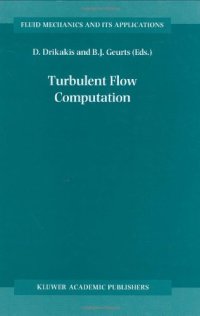
Ebook: Turbulent Flow Computation
- Genre: Mathematics // Computational Mathematics
- Tags: Mechanics, Mathematical and Computational Physics
- Series: Fluid Mechanics and Its Applications 66
- Year: 2004
- Publisher: Springer Netherlands
- City: Dordrecht :, Boston
- Edition: 1
- Language: English
- djvu
In various branches of fluid mechanics, our understanding is inhibited by the presence of turbulence. Although many experimental and theoretical studies have significantly helped to increase our physical understanding, a comp- hensive and predictive theory of turbulent flows has not yet been established. Therefore, the prediction of turbulent flow relies heavily on simulation stra- gies. The development of reliable methods for turbulent flow computation will have a significant impact on a variety of technological advancements. These range from aircraft and car design, to turbomachinery, combustors, and process engineering. Moreover, simulation approaches are important in materials - sign, prediction of biologically relevant flows, and also significantly contribute to the understanding of environmental processes including weather and climate forecasting. The material that is compiled in this book presents a coherent account of contemporary computational approaches for turbulent flows. It aims to p- vide the reader with information about the current state of the art as well as to stimulate directions for future research and development. The book puts part- ular emphasis on computational methods for incompressible and compressible turbulent flows as well as on methods for analysing and quantifying nume- cal errors in turbulent flow computations. In addition, it presents turbulence modelling approaches in the context of large eddy simulation, and unfolds the challenges in the field of simulations for multiphase flows and computational fluid dynamics (CFD) of engineering flows in complex geometries. Apart from reviewing main research developments, new material is also included in many of the chapters.
Presents a coherent account of contemporary computational approaches for turbulent flow. Aims to provide the reader with information about the current state of the art as well as the directions for future research and development.